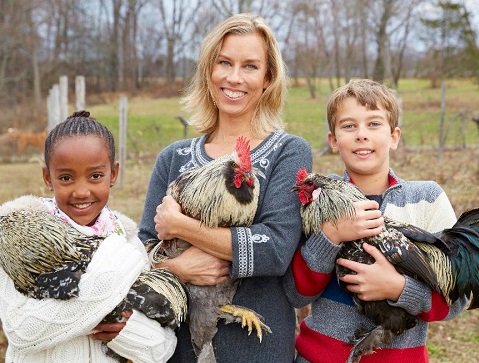
By Patricia Caso/June, 2018
Photos: Circe
There is nothing average about Dr. Marika Lindholm, a sociologist, professor and writer. Because she lived the life-changing experience of being a single mom, Marika is using that experience and academics to become an outspoken advocate for solo moms. In 2015, Marika started a social movement, Empowering Solo Moms Everywhere, with ESME.com.
“I’d made a vow that if I ever had the opportunity, I would help other moms as they navigated parenting alone.” Marika Lindholm
Currently there are 15 million children (younger than 18) being raised by a solo mom. Any mom knows that there is nothing easy about and little more rewarding than raising kids.
Now Marika has co-edited an inspirational anthology We Got This: Solo Mom Stories of Grit, Heart and Humor. I wanted to get to know more about Dr. Lindholm’s motivations and insights on this often overlooked and critically important group, solo moms…
EYE: You are a successful professor who went through a period of being a single mom, remarried, and are now raising eight kids. Why did you think it important to start ESME (Empowering Solo Moms Everywhere)?
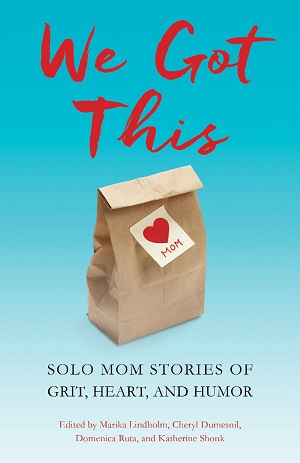 MARIKA: I was remarried and we’d moved to a farm in the Hudson Valley so that we could give all our kids an opportunity to live in a more natural setting. I considered teaching locally but remembered a promise I’d made to myself during one of the darkest times of my divorce.
MARIKA: I was remarried and we’d moved to a farm in the Hudson Valley so that we could give all our kids an opportunity to live in a more natural setting. I considered teaching locally but remembered a promise I’d made to myself during one of the darkest times of my divorce.
I’d made a vow that if I ever had the opportunity, I would help other moms as they navigated parenting alone.
Being a single mom was one of the hardest and most intense times of my life and now I wanted to use that experience and my sociological skills to help others on the same journey.
The website with its resources, articles and community for Solo Moms is truly an expression of everything I’ve learned along the way and more.
EYE: What was your experience as a single mom?
MARIKA: One of the defining features of my divorce was that for a woman who’d always felt strong and capable, the process of getting divorced made me feel weak and powerless. In fact, the stress and the lack of sleep led to me getting sick – so sick that I had an undiagnosed blood disorder for months.
Each day until I was diagnosed, and easily treated, was a nightmare of fevers, rashes and exhaustion. It truly was my lowest most vulnerable point and I had to rebuild myself to become a strong, solo mom.
A community of old and new friends were there for me as I became physically and emotionally stronger. Suddenly one day I realized that I felt good and I was happy!
EYE: What would you do at your low points when you felt overwhelmed?
 MARIKA: When I was going through my divorce, I lost friends because folks felt compelled to take sides or felt awkward about my new situation. I definitely felt lonely because I projected as a strong person and didn’t show that I was overwhelmed — which I was!
MARIKA: When I was going through my divorce, I lost friends because folks felt compelled to take sides or felt awkward about my new situation. I definitely felt lonely because I projected as a strong person and didn’t show that I was overwhelmed — which I was!
I turned to books by incredible women writers and found solace in the struggles expressed by Toni Morrison, Maxine Hong Kingston, Louise Erdrich and many more. I guess it’s not that surprising that I ended up putting together We Got This!
EYE: Why is it important to you to now publish this anthology, We Got This?
MARIKA: When I went through my divorce, I wanted a book that spoke to my emotions but all I could find were advice books. Of course as an academic I read all those but what I really needed was to hear that I wasn’t alone in my struggle, that my roller coaster of emotions was normal, and that my kids and I were going to be OK.
Our anthology is the book I needed back then — a love letter to solo moms that is honest and inspirational all at once.
EYE: You cover such a range of thoughts and emotions with the 75 solo moms in We Got This. To name a few, you have a piece by Amy Poehler on divorce as well as Faleeha Hassan on My Life as a Refugee to Crying It Out by Robin Silbergleid.
MARIKA: Yes! Our goal was to be an inclusive as possible to showcase the many wonderful voices that come together to show a fierce love for their children amidst a variety experiences and challenges.
You will find a broad array of experiences: domestic violence; children with special needs; a partner in prison; having a heart attack when dad is deployed; a partner’s mental illness and of course the joys of solo motherhood as well.
EYE: You’ve chosen to not to be a how-to guide for single moms, instead focusing on inspiration and relating to others experiences. Why?
MARIKA: By including moms that represent different routes to solo motherhood and diversity in identity, we are giving voice to moms that often get left out of the mainstream discussions of motherhood.
Given the number of moms who will, or have solo parented, it’s about time we honor their challenges and dedication to their children. It’s absolutely about connection and recognition. We are saying to solo moms we see you and you are amazing!
EYE: Is there a unifying thread that all these single moms share?
MARIKA: Each story is different yet two themes are woven throughout: resilience and fierce love for their children. This is something I’ve learned about solo moms in general — they will work two jobs, compromise sleep, anything to do best by their kids. They are resilient and dedicated.
EYE: Is there a typical profile of a solo mom?
MARIKA: There isn’t a “typical” profile but most women become solo moms due to divorce. Unlike stereotypes about single moms having lots of kids and living off the government, most have one or two children and are employed.
They do, however, face greater financial challenges than other demographic groups. There are changes on the horizon, however. Divorce rates are decreasing and the number of solo moms by choice are on the rise. Increasingly, women are making the decision to parent alone whether by birth or adoption.
And as our book demonstrates there are a myriad of reasons that women end up parenting alone.
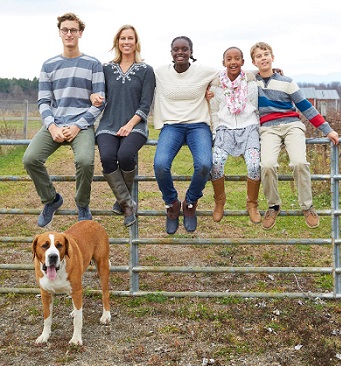
EYE: What do you find challenges solo moms the most in their day-to-day lives?
MARIKA: The work/family balance is by far the greatest challenge. Childcare is expensive, family leave isn’t guaranteed and solo moms face the herculean task of employment and parenting with little support. Even something as basic as staying home to care for a sick child is a risk.
EYE: Does affluence change the challenges?
MARIKA: Clearly, being able to afford to be a stay at home mom or hire a nanny changes the day-to-day threat that most solo moms experience. But this doesn’t remove the daily responsibility that all solo moms experience, such as no one to confer with in terms of medical and educational decisions and no cheerleader to remind you that you are doing a great job.
EYE: Are there proactive “attitudes” that successful solo moms adopt?
MARIKA: Solo moms are often fiercely independent and don’t ask for help. In fact, when I first launched ESME, focus groups showed that many moms didn’t feel they needed an online community, but when we delved further it was clear they many felt lonely and overwhelmed.
They were making it work for their children but the cost was high — lack of sleep, no personal life and lots of guilt! At ESME, we now know that “successful” solo moms ask for help, build tribes and ditch the mom guilt.
EYE: How did your experience as a single mom affect you in your remarriage?
MARIKA: Most of us who remarry are much more prepared for our second act! I am a stronger and more resilient partner because of my time as a solo mom. I’m able to weather the inevitable highs and lows with less drama and more optimism. And I generally feel more accomplished and ready to take on parenting challenges.
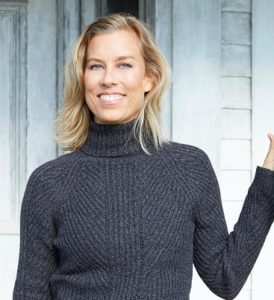 EYE: What does it mean to “empower” a solo mom?
EYE: What does it mean to “empower” a solo mom?
MARIKA: At ESME, we seek to empower solo moms through information, awareness and connection. Solo moms can draw on each other’s experience as well as feel buoyed and strengthened by our supportive community. We are more powerful together.
EYE: Can there really be a perfect balance between work and home life?
MARIKA: Never. Right now mothers are expected to work as if they don’t have children and parent as if we don’t have jobs. This is untenable. But that doesn’t mean we give up. We do the best we can.
EYE: Have you seen any cultural changes over the last couple of decades?
MARIKA: I wish I could say that it’s gotten much better for solo moms but it has gotten a little better. The rise of solo moms by choice and representations of solo moms in the media have reduced some of the stereotypes.
But there are still too many instances when solo moms are blamed for society’s ills. We need to get past these stigmas and acknowledge that many more kids of solo moms are doing great. In fact, that’s our next book — a look at the profound, positive impact of children of solo moms.
EYE: Since the economy is doing well, are more single/solo moms benefitting?
MARIKA: So far I haven’t seen an uptick in solo moms’ well being. Given the challenges of childcare, rent prices and wage stagnation, they are absolutely a group that will continue to struggle or do worse if our economy suffers.
As a sociologist in the trenches, I don’t understand why solo moms, who raise 23 million American children, aren’t supported and valued more fully. By increasing the well-being of solo moms we guarantee a better future not only for them but all Americans.
 EYE: Can your site and books be relevant to two parent families?
EYE: Can your site and books be relevant to two parent families?
MARIKA: Lots of married and partnered parents use our site for information but they can’t join our chat room unless they are planning to be, are currently or were a solo mom. The book will resonate with anyone parenting because it is honest about the joys and challenges of raising children.
In terms of supporting a solo mom, two parent families can ask a solo mom what she needs or offer to make her a meal. I’d be hard pressed to find any solo mom who turns down a home-cooked meal!
EYE: What are the upsides to being a solo mom?
MARIKA: Freedom to raise you kids as you choose. Less conflict over parenting decisions. A sense of efficacy and control that grows over time and is quite empowering.
EYE: What do you want readers to get from this book?
MARIKA: I hope that any reader will appreciate and connect with these well-crafted, and profoundly human stories. Ideally, non-solo moms will gain appreciation and insight to the daily challenges and talents of solo moms.
Our VIP audience of solo moms should feel that they are honored, inspired and honestly represented. And most importantly, that solo doesn’t mean alone.
EYE: Bottom line, what is your advice to any single mom starting out?
MARIKA: Don’t be afraid to ask for help and say yes when its offered. Also, self-care, which means that every now and then you dare to put your needs front and center: sleep, have fun, pursue a passion.
You can’t be the best mom you can be without self-care. Overall: Hang in there, it gets easier.
EYE: Thank you for your time and thoughts, Marika. May you have even more success with your important movement on behalf of solo moms! Good luck with your book which is available Sept. 10, 2019 in paperback!
TWITTER: marika_lindholm
TWITTER: ESME_SoloMoms
FACEBOOK: ESMESoloMoms
INSTAGRAM: esme_solomoms
###
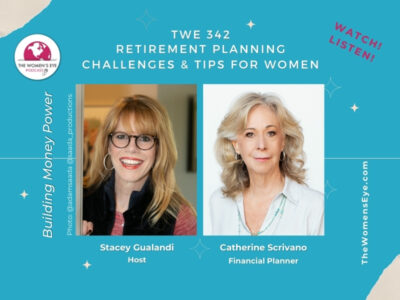


Leave a Reply